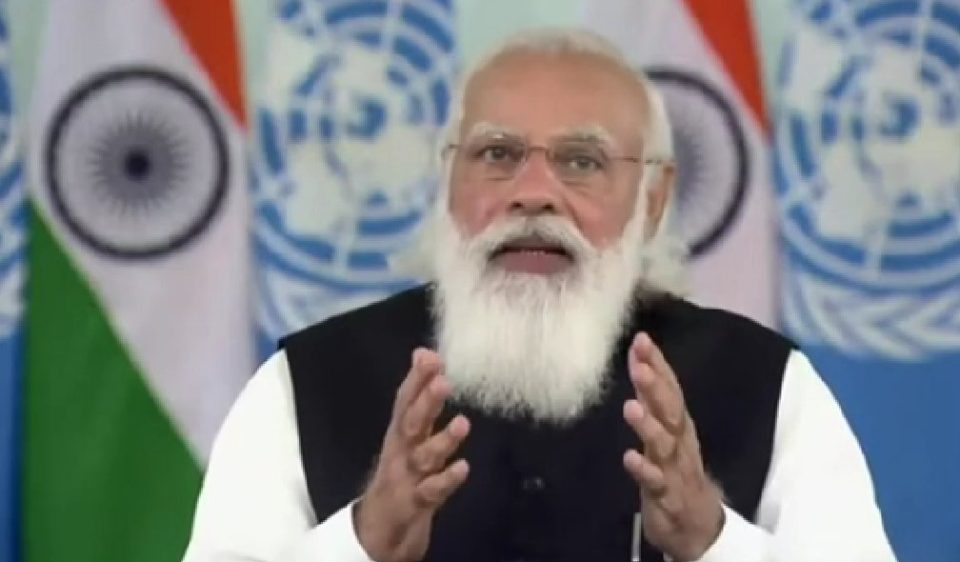
Mann Ki Baat encourages sustainable growth, citizen participation, says study backed by Gates Foundation

A study supported by the Bill and Melinda Gates Foundation has found that Prime Minister Narendra Modi’s Mann Ki Baat radio program has evolved into an inspirational platform that promotes sustainable progress on priority themes essential to India’s pursuit of the sustainable development goals.
Since its inception in 2014, the monthly radio broadcast has become a key pillar of the government’s citizen-outreach program, the study titled “Mann Ki Baat – A Decade of Reflection” added.
The objective of the study, the report said, was to perform a quantitative and qualitative textual analysis of 99 transcripts of the Mann Ki Baat episodes published from 2014-2023 using text-mining tools as well as to identify the most prominently discussed thematic areas in the programme.
Also Read: Congress has abused me 91 times: PM Modi at Karnataka poll rally
The Institute for Competitiveness (IFC) is the research partner in the study, while Axis My India is its knowledge partner.
The Mann Ki Baat’s efforts to raise awareness of global and local problems, celebrate grassroots solutions, and encourage citizen activism have contributed to India’s progress towards the SDGs with the programme focussing on five thematic areas — cleanliness and sanitation, health, wellness, water conservation, and sustainability — the report said.
By sharing examples of efforts of common citizens, and by highlighting stories of progress and change, Mann Ki Baat has transformed into an inspirational platform that is encouraging sustainable progress on priority themes that are core to India’s efforts towards achieving sustainable development goals (SDGs), the report said.
The programme highlights government and citizen action in these priority areas and in turn encourages listeners to establish or participate in change making initiatives in their own communities with the aim to have a lasting and sustainable impact on lives of people and for the country, it said.
Also Read: PM Modi’s 100th Mann Ki Baat episode to air live at UN headquarters
Mann Ki Baat has catalysed collective action towards achieving SDGs. It has encouraged listeners to participate in societal change making and citizen engagement at the heart of the programme, the report added.
The report said celebrating the spirit of India’s change makers and people’s action by speaking directly to ordinary people is at the core of Modis Mann Ki Baat.
Themes such as environmental sensitivity, development challenges, water conservation and sustainability help to raise public awareness about these subjects and energise people to experiment with new, innovative, and long-term solutions, for India and the world, it said.
The radio programme emphasises the role of start-ups and small businesses in achieving a self-reliant India; encourages people of all ages to take action to promote the social and environmental causes that matter most to them; and spreads the word about government policies, programmes, and initiatives aimed at economic, social, and sustainable development, the report underlined.
Also Read: Karnataka polls will open door for Congress in 2024 LS elections: Shivakumar
Just as Mann Ki Baat speaks directly to ordinary people, it celebrates their achievements within and beyond their communities, it added.
The report said the programme also connects people to their culture and traditional values.
Through Mann ki Baat, our traditional practices such as Yoga, Ayurveda and constant learning are reinforced and these conversations connect us back to our roots, the report said.
While the people of India are modern, contemporary, and global in their outlook, the prime minister’s regular interaction with them ensures that they never lose touch with the core rich cultural heritage and values, it added.
Over 100 crore people have connected to Mann Ki Baat at least once, the report said, adding that the conversational, personal tone and practical subject matter make the prime ministers radio broadcast feel more relevant, contextual and accessible to its audience.
(With agency inputs)

